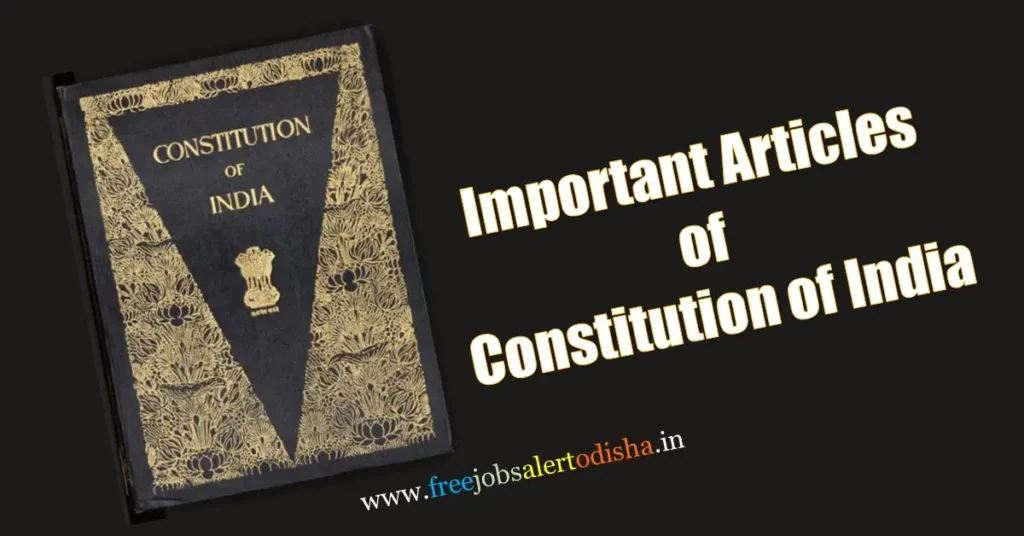The Indian Constitution consists of a total of 470 articles as of 2022. The Constitution of India is the second-largest operational Constitution in the world. These articles are divided into 25 parts, 12 schedules, and 5 appendices. Originally, it comprised 395 articles divided into 22 divisions and 8 schedules, which cover a wide range of topics such as fundamental rights, directive principles of state policy, the structure and functioning of the government, elections, judiciary, and many others. The Constitution was adopted on November 26, 1949, and came into effect on January 26, 1950.

Important Articles of Constitution of India
Here is the list of various important Articles of the Indian Constitution.
| Article Number | Title/Description |
|---|---|
| 1 | Name and territory of the Union |
| 3 | New States Formation, Alteration of Boundaries, etc. |
| 13 | Laws inconsistent with or in derogation of the Fundamental Rights |
| 14 | Equality before law |
| 19 | Protection of certain rights regarding freedom of speech, etc. 19(a) – Freedom of Speech & Expression 19(b) – Right to Peaceful Assembly 19(c) – Freedom of Association 19(d) – Right to Move Freely through India 19(e) – Freedom of Settlement & Residence 19(f) – (Omitted as a fundamental right – governed by article 300A.) Right to Own Personal Property. 19(g) – Freedom to Practise any Profession, Occupation, Trade or Business |
| 21 | 21 – Protection of life and personal liberty 21(a) – Right to Education |
| 23 | Prohibition of Human Trafficking and Forced Labour |
| 24 | Prohibition of Child Labour |
| 25 | Freedom to Practise & Propagate Religion Freely |
| 32 | Right to Constitutional Remedies |
| 40 | Organisation of Village Panchayats |
| 44 | Uniform civil code for the citizens |
| 48 | Organisation of agriculture and animal husbandry |
| 51 | 51 – Promotion of international peace and security 51(a) – Fundamental Duties |
| 72 | Powers of President to Grant Pardons etc. |
| 74 | Council of Ministers to aid and advise President |
| 76 | Attorney-General of India |
| 78 | Duties of Prime Minister |
| 86 | Right of President to address and send messages to Houses |
| 93 | The Speaker & Deputy Speaker of Lok Sabha |
| 100 | Voting in Houses, power of Houses to act notwithstanding vacancies and quorum |
| 112 | Annual financial statement, Budget |
| 139 | Supreme Court’s Powers to Issue Certain Writs |
| 141 | Supreme Court’s Law Binding on All Courts |
| 155 | Appointment of Governor |
| 161 | Power of Governors to Grant Pardon etc. |
| 165 | Advocate-General for the State |
| 167 | Duties of Chief Minister |
| 226 | Power of High Courts to issue certain writs |
| 246 | Subject-matter of laws made by Parliament and by the Legislatures of States |
| 280 | Finance Commission |
| 300(a) | Right to Property (abolished) |
| 312 | All India Services |
| 324 | Election Commission |
| 335 | SCs and STs claim to Services and Posts |
| 343 | Official Language |
| 352 | National Emergency |
| 356 | President’s Rule in case of Failure of Constitutional Machinery in States |
| 360 | Financial Emergency |
| 368 | Power of Parliament to Amend the Constitution |
| 370 | Temporary provisions with respect to the State of Jammu and Kashmir |
FAQs
-
How many articles are there in the Indian Constitution as of 2022?
There are 470 articles in the Indian Constitution as of 2022.
-
What is the significance of Article 370 of the Indian Constitution?
It granted special status to Jammu and Kashmir. It was abrogated in 2019 leading to the full integration of Jammu and Kashmir into the Indian Union.
-
What are the fundamental rights guaranteed by the Indian Constitution?
Six fundamental rights – right to equality, freedom, against exploitation, freedom of religion, cultural & educational rights, and right to constitutional remedies.
-
What is the significance of Article 21 of the Indian Constitution?
Article 21 guarantees the right to life and personal liberty to every citizen of India. This fundamental right has been interpreted by the courts to include a wide range of rights such as the right to privacy, right to clean environment, right to legal aid, and more.
-
What is the significance of Article 15 of the Indian Constitution?
Article 15 prohibits discrimination on the grounds of religion, race, caste, sex, or place of birth. It provides for the promotion of equality and social justice, and the prevention of social discrimination.
-
What is the role of the Election Commission of India mentioned in the Constitution?
The Election Commission of India is a constitutional body that is responsible for conducting free and fair elections in the country. It is responsible for preparing and updating electoral rolls, supervising elections, and enforcing the Model Code of Conduct for political parties and candidates.
Check which are the Top 10 Competitive Exams In India
